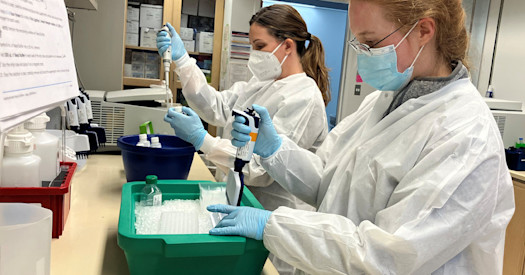 Carrie Brockway: 'We are leading Seattle forward as the epicenter of synthetic biology and the potential discovery of new treatments for cancer and other tough diseases.'
Carrie Brockway: 'We are leading Seattle forward as the epicenter of synthetic biology and the potential discovery of new treatments for cancer and other tough diseases.'
“Once you leave bench science, you’re not going back. For me it was a great choice.”
Carrie Brockway has made a lot of great professional choices in her life. The most recent – accepting the position of Executive Director for SeaBridge with the Allen Institute – reflects what one could say is an uncompromising commitment to collaborative science.
“SeaBridge and the Seattle Hub for Synthetic Biology represent the confluence of all that I love: compelling scientific research and leading-edge technology,” Brockway said. “The opportunity to program cells has significant potential to make a huge difference in people’s lives, unlocking therapeutic possibilities. Moreover, this is a highly collaborative and motivated group whose members also like to have fun.”
The potential for Brockway herself to make a difference was evident at a young age. She admits she was “the kid who could not stop moving and needed to be doing something all the time.” She job shadowed physicians while she was in high school, but soon realized, “while medicine is an honorable profession,” she wanted to do more that “just putting a Band-Aid” on problems.
“I wanted to make a longer-term impact,” Brockway said. “Coupled with my desire to constantly solve new problems, I was drawn to chemistry.”
She completed a Bachelor’s of Science degree in Chemistry from Miami University in her home state of Ohio, as well as a Ph.D. in the same discipline from the University of Utah. Rather than pursue “the traditional route” of post-doctoral studies, she landed a job in July of 2000 at Pfizer, the global pharmaceutical and biotechnology corporation, then headquartered in Groton, Connecticut.
Brockway started as a Senior Principal Scientist and over her tenure she advanced into several positions, including business development in the firm’s neuroscience development unit in Cambridge, Massachusetts; and leading senior-level operations for the Chief Medical Officer in New York. In the latter role, she worked closely with the Pfizer Medical Leadership Team and key external partners and organizations.
She learned to excel in business strategy and development in the demanding Big Pharma sector. But 11 years and too many international business trips later, she “decided to go back to school to learn what I was actually doing.” That decision led her to the Sloan School of Management at MIT.
“It was a great mix of the geek factor, data analysis, and business foundations,” she said.
'A great immersion into innovative, collaborative research.'
After completing an MBA, Brockway said she took “huge left turn.” Rather than return to an executive position in the corporate sector, she joined the Broad Institute, the Cambridge-based biomedical and genomic research center, as a Senior Advisor.
“I think of my time at the Broad as my post-doc,” she said. “It was a great immersion into innovative, collaborative research.” Brockway sat on the Broad’s leadership team and worked directly with Aviv Regev, now the Executive Vice President of Research and Early Development at Genentech.
Brockway’s role at the Broad ended after only two years when she received a call from a former colleague who needed her help launching start-up ventures. Those new companies included Ascidian, a biotechnology firm developing exon-editing RNA therapeutics to target underlying causes of disease. She served at Ascidian for more than five years, the last three-plus as Senior Vice President and Head of Operations.
Last year, she heard about the Seattle Hub for Synthetic Biology and the prospect of Seabridge. This five-year endeavor, funded by the Washington Research Foundation, the Chan Zuckerberg Initiative (CZI) and the UW’s Brotman Baty Institute (BBI), has two components: a fellowship program to recruit and train post-docs to advance Seattle Hub’s technologies through local host laboratories; and LaunchPad, an effort to create start-up companies focusing on therapeutics, diagnostics, and other cell-based technologies based on Seattle Hub research.
Seattle Hub is a collaboration among Allen, CZI, BBI, and UW Medicine. It started in January 2024 to generate foundational datasets, models, and molecular infrastructure to re-engineer cells to record their own histories and reprogram disease states into healthy functions.
Dr. Marion Pepper, Ph.D., a co-director of the Seattle Hub for Synthetic Biology and chair of the UW Medicine Department of Immunology, said Brockway was the “obvious choice” to head up SeaBridge.
“Carrie’s scientific training and extensive industry experience made her an obvious choice,” Pepper said. “We needed someone who was excited both about building our trainee community and new companies.”
Like Pepper, Dr. Jesse Gray, Ph.D., the Senior Director of Strategy and Operations for Seattle Hub, believes Brockway brings the gifts needed for her demanding role.
“Carrie has an uncanny ability to know what to focus on to convert the raw material of discovery into medicine,” he said.
Brockway believes her SeaBridge and Seattle Hub colleagues are equipped to meet the high demands – and expectations – of this groundbreaking project.
“The ability to capture data from cells as they mature, without sacrificing them, as well as to gather data, can change of the course of a disease,” Brockway said. “The incoming SeaBridge post-docs will have the extraordinary opportunity to work alongside the Seattle Hub team, combining cellular reprogramming technology with some of the best and brightest in Seattle’s biotech and academic communities. We are leading Seattle forward as the epicenter of synthetic biology and the potential discovery of new treatments for cancer and other tough diseases.”


